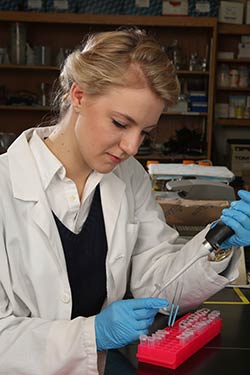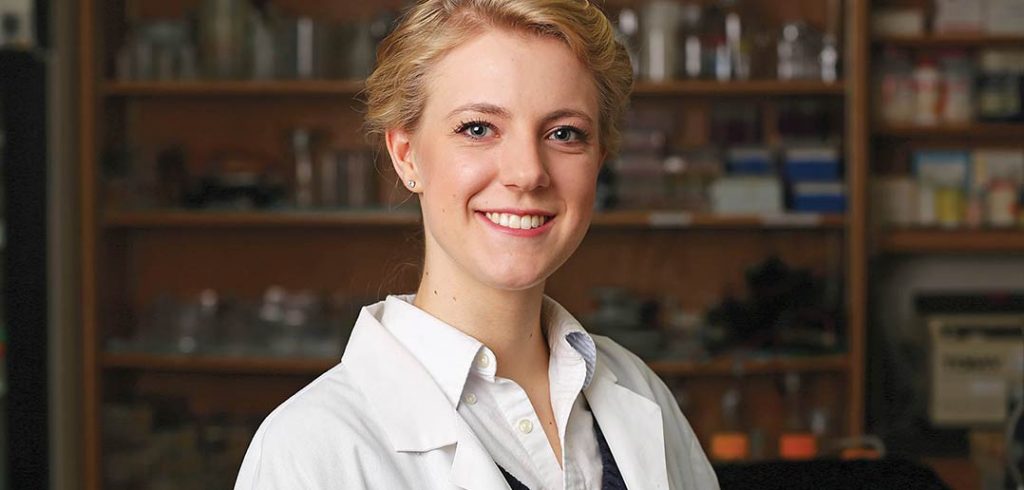Alexandra Makara has always been interested in a career in science, so when she enrolled at Fordham she was determined to take advantage of every research opportunity she could find. Little did she know that by her sophomore year she’d be collaborating with some of the world’s most gifted scientists and cancer researchers.
This past summer she was one of 50 people selected to participate in an undergraduate research program at the University of Texas MD Anderson Cancer Center in Houston. One of the world’s preeminent medical institutions, MD Anderson counts among its faculty many pioneers in cancer prevention research.
“It was so impactful to know that they were once my age and now are world-renowned researchers,” Makara said of meeting such faculty, including the center’s president, Fordham graduate Ronald DePinho, MD, FCRH ’77.
“He said that we have the power to change the world, and that it takes two things to succeed: drive and collaboration. He can captivate a room,” Makara said of DePinho, who came to Fordham in 2012 to speak to pre-med students on advances in cancer research. “He was down to earth and eager to talk to students.”

During the 10-week program, Makara worked alongside a postdoctoral fellow, Jessica Bowser, PhD, and a professor, Russell Broaddus, MD, PhD, in the pathology lab, aiding in their research of treatments for low-grade endometrial cancer. This type of cancer generally has a high cure rate, Makara said, but in some patients the disease is returning months or years later having spread to other parts of the body—possibly due to a special type of mutation in tumors, the ß-catenin mutation. Since treatments, including chemotherapy, are not wholly successful, “developing targeted therapies is the next best option,” said Makara, who focused on a particular pathway in the mutation.
Bowser and Broaddus “have such a passion for what they do,” said Makara, “and always kept me motivated throughout all the successes and the technical difficulties.”
When she wasn’t working in the lab, Makara said she enjoyed attending grand rounds, where doctors and researchers from around the world present the latest in medical education. One day she walked into a lecture unaware of the topic at hand, but the presentation on acute pain in head and neck patients undergoing radiotherapy caught her interest. She soon started shadowing the chief of oral oncology at MD Anderson, Mark Chambers, DMD. He introduced her to specialties that “merged my love for cancer research and my new passion for dentistry.
“I didn’t know how captivating it would be,” said Makara, a biology and English double major. “It made science fun.”
At the end of the program, Makara and her fellow students presented their summer work at a poster session, where students, faculty, and physicians could ask questions about the research. In November, back at Fordham, she was asked to present her research on endometrial cancer at a Fordham Science Council meeting. This April she is presenting her work at Harvard Medical School’s New England Science Symposium and at Fordham’s Eighth Annual Undergraduate Research Symposium.
She’s back in the lab, too. After taking a virology course taught by Patricio Meneses, PhD, associate professor of biology at Fordham, Makara asked to join his lab, where he studies HPV, or human papillomavirus.
The most common sexually transmitted virus in the United States, HPV is responsible for an estimated one-third of the 1.5 million cancers attributed to viruses. Makara is in his lab three hours a day, three times a week, assisting in research on how to lessen the virus’s potentially deadly power.
“The fact that there is this kind of opportunity on campus,” said Makara, a native of Long Island and a first-generation Polish American, “enhances my skills and adds to my knowledge.”
She envisions pursing dentistry with a specialty in oral oncology and head and neck cancer. But for now, Makara will continue her research at Fordham—and again in Houston: She’s been invited to return to MD Anderson this summer.
– Rachel Buttner

